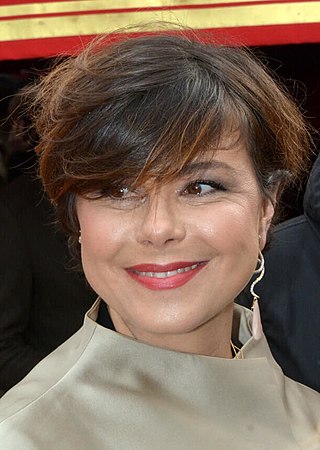The Cinema of Benin refers to the film industry of the Republic of Benin in West Africa.
Sources differ as to the which was the first Beninese film, with some pointing to the short Lumière des hommes (1954, director unknown), [1] with others pointing to the work of Pascal Abikanlou, who made a number of documentaries in the 1960s, followed by his first feature film Sous le signe du vaudou in 1974. [2] [3] Richard De Medeiros was another noted director of the early independence years, beginning with 1970's Le roi est mort en exil, an examination of Béhanzin, the last king of Dahomey. [4] He went on to make the feature-length Le nouveau venu (1972), which explored the issue of corruption and the conflict between modernity and tradition in Benin. [5] François Okioh made a number of short documentaries in the 1980s, as well as the feature-length dramas Ironou (1985) and Enfants de... (1985). [6] Noted filmmakers of the last two decades are Jean Odoutan (Barbecue Pejo, 2000; Pim-Pim Tché, 2010), Idrissou Mora Kpai (Si-Gueriki, la reine-mère, 2002) and Sylvestre Amoussou (Africa Paradis, 2006).
This is a sortable list of films produced in Benin. [7] [1] [8] [4] [6]
| Year | Title | Director | Genre | Notes |
|---|---|---|---|---|
| 1954 | Lumière des hommes | ? | Short | English title: Light of Men |
| 1967 | Ganvié, mon village | Pascal Abikanlou | Documentary, short | English title: Ganvié, My Village |
| 1968 | Escale au Dahomey | Pascal Abikanlou | Documentary, short | English title: Stopover in Dahomey |
| 1969 | Premières offrandes | Pascal Abikanlou | Documentary, short | English title: First Offerings |
| 1969 | Fête de l'igname | Pascal Abikanlou | Documentary, short | English title: Yam Festival |
| 1970 | Le roi est mort en exil | Richard de Medeiros | Drama, short | English title: The King Died in Exile |
| 1971 | Opération Sonader | Pascal Abikanlou | Documentary, short | English title: Operation Sonader |
| 1971 | De l'eau et de l'ombrage | Pascal Abikanlou | Documentary, short | English title: Water and Shade |
| 1972 | Téké, hymne au Borgou | Richard de Medeiros | Documentary, short | English title: Téké, Hymn of Borgou |
| 1972 | Silence et feu de brousse | Richard de Medeiros | Drama, short | English title: Silence and Bushfire |
| 1974 | Sous le signe du vaudou | Pascal Abikanlou | Drama | English title: Under the Sign of Voodoo |
| 1975 | L'Afrique au Rendez-vous de l'Année Sainte | Pascal Abikanlou | Documentary short | English title: Africa at the Rendezvous of the New Year |
| 1976 | Le Nouveau venu | Richard De Medeiros | Drama | English title: The Newcomer |
| 1980 | Ces Collines ne sont pas muettes | François Okioh | Documentary, short | English title: These Hills are not Silent |
| 1982 | Le Fleuve a tout emporté | François Okioh | Documentary, short | English title: The River Swept Everything |
| 1983 | Ogu | François Okioh | Documentary, short | |
| 1985 | Enfants de... | François Okioh | Drama | English title: Infants of... |
| 1985 | Ironou | François Okioh | Drama | |
| 1989 | Dan xome royaume des Huegbadjavi | Pascal Abikanlou | Documentary | English title: Dan Xome, Kingdom of Huegbadjavi |
| 1991 | Debout les morts | ? | Television production | English title: Up the Dead |
| 1991 | Les Tresseurs de Corde | François Okioh | Drama | English title: The Mat Cutters |
| 1992 | Vent de l'espoir | Pascal Abikanlou | Documentary | English title: Wind of Hope |
| 1993 | Ouidah 92 | Pascal Abikanlou | Documentary | |
| 1998 | Divine carcasse | Dominique Loreau | Drama | English title: Divine Carcass |
| 1999 | Génération perdue | M. Pounie | English title: Lost Generation | |
| 2000 | Barbecue-Pejo | Jean Odoutan | Drama | |
| 2000 | Le Pays Idaasha | François Okioh | Drama | English title: Dassa Country |
| 2002 | Si-Gueriki, la reine-mère | Idrissou Mora Kpai | Drama | English title: Si-Gueriki, the Queen Mother |
| 2004 | La Valse des gros derrières | Jean Odoutan | English: The Waltz of the Big Behinds | |
| 2006 | Abeni | Tunde Kelani | Drama | Benin-Nigeria co-production |
| 2006 | Africa Paradis | Sylvestre Amoussou | Drama/comedy | English title: Africa Paradise |
| 2006 | Abeni 2 | Tunde Kelani | Drama | Benin-Nigeria co-production |
| 2006 | Crânes épais... lèvres fausses | François Okioh | Documentary, short | English title: Thick Skulls... False Lips |
| 2007 | L'Amazone candidate | Sanvi Panou | Documentary | English title: The Amazon Candidate |
| 2010 | Pim-Pim Tché | Jean Odoutan | Drama | |
| 2010 | Shed No Tears | Kaitlyn Summerill | Documentary | |
| 2011 | Un pas en avant - Les dessous de la corruption | Sylvestre Amoussou | Comedy | English title: One Step Forward - The Bottom of Corruption |
| 2011 | Indochine, sur les traces d'une mère | Idrissou Mora Kpai | Documentary | English title: Indochina: Traces of a Mother |
| 2011 | Femme d'Afrique | Milja Viita | Documentary short | English title: Woman of Africa |
| 2011 | Larmes de sang | Laitan Faranpojo & Mark Koumagnon | English title: Tears of Blood | |
| 2012 | La personne de Georges Adéagbo | Matteo Fritelli | Documentary | English title: The Person of Georges Adéagbo |
| 2012 | Possessed by Voodoo | Sergey Yastrzhembskiy | Documentary | |
| 2012 | The Camp | Jean-Frédéric de Hasque | Documentary | |
| 2014 | Dreamcycles | Nelson Roubert | Documentary | |
| 2015 | Gangbé! | Arnauld Robert | Documentary | |
| 2016 | Vindicte | Ange-Régis Hounkpatin | Drama, short | English title: Retribution |
| 2016 | Bight of the Twin | Hazel Hill McCarthy III | Documentary | |
| 2016 | Dassa-Zoume | Christophe Blanpied | Documentary, short | |
| 2017 | L'orage africain: un continent sous influence | Sylvestre Amoussou | Drama | English title: The African Storm |
| 2017 | Studio Harmattan | Stefanos Pavlakis | Experimental short | |
| 2018 | In Search of Voodoo: Roots of Heaven | Djimon Hounsou | Documentary | |
| 2018 | ZanKlan | Arcade Assogba | Drama, short | |
| 2018 | When God is Among Us | Aidan Macaluso | Documentary, short | |

Cinema of Africa covers both the history and present of the making or screening of films on the African continent, and also refers to the persons involved in this form of audiovisual culture. It dates back to the early 20th century, when film reels were the primary cinematic technology in use. During the colonial era, African life was shown only by the work of white, colonial, Western filmmakers, who depicted Africans in a negative fashion, as exotic "others". As there are more than 50 countries with audiovisual traditions, there is no one single 'African cinema'. Both historically and culturally, there are major regional differences between North African and sub-Saharan cinemas, and between the cinemas of different countries.
The Cinema of Niger began in the 1940s with the ethnographical documentary of French director Jean Rouch, before growing to become one of the most active national film cultures in Francophone Africa in the 1960s-70s with the work of filmmakers such as Oumarou Ganda, Moustapha Alassane and Gatta Abdourahamne. The industry has slowed somewhat since the 1980s, though films continue to be made in the country, with notable directors of recent decades including Mahamane Bakabe, Inoussa Ousseini, Mariama Hima, Moustapha Diop and Rahmatou Keïta. Unlike neighbouring Nigeria, with its thriving Hausa and English-language film industries, most Nigerien films are made in French with Francophone countries as their major market, whilst action and light entertainment films from Nigeria or dubbed western films fill most Nigerien theatres.

The cinema of Senegal is a relatively small film industry which experienced its prime from the 1960s through to the early 1980s, but has since declined to less than five feature films produced in the last ten years. Senegal is the capital of African cinema and the most important place of African film production after its independence from France in 1960.

Fatma Zohra Zamoum is a Franco-Algerian writer, filmmaker and educator.

Taïeb Louhichi was a Tunisian film director, screenwriter, producer and filmmaker. His best known works include his debut feature film, Shadow of the Earth (1982), Layla, My Reason (1989), and La Danse Du Vent (2004).
The Prix Luc-Perreault, formerly known as the Prix L.-E.-Ouimet-Molson, is an annual Canadian film award, presented by the Association québécoise des critiques de cinéma to a film deemed to be the best film of the year from Quebec, from among the films screening at that year's Rendez-vous Québec Cinéma.
Elvire Adjamonsi is a Beninese filmmaker, actor, journalist and cultural developer. She is known for her documentary films and for her work in creating and managing film festivals and cultural institutions across Africa.

Kollo Daniel Sanou is a Burkinabé film director as well as a screenwriter and producer of both fiction and documentary films.
Pascal Abikanlou was a Beninese film maker, director and producer. He is considered the "father of Beninese cinema".
The Central African Republic is one of the world's poorest countries and the film industry is correspondingly small. The first film made in CAR appears to have been Les enfants de la danse, a short French-made ethnographic documentary of 1945. Joseph Akouissone was the first Central African to make a film in the country, with his 1981 documentary Un homme est un homme; he was followed by the documentaries made in the 1980s by Léonie Yangba Zowe. Since then a series of ongoing conflicts and economic crises have severely limited the potential growth of film-making in the country. The first feature-length drama made in the country was Le silence de la forêt, a 2003 CAR-Gabon-Cameroon co-production about the Biaka people.
Faissol Fahad Bolade Gnonlonfin is a Beninese film director and producer.
Richard De Medeiros is a Beninese film director.

Mounia Meddour is a Franco-Algerian film director.
Wandering: A Rohingya Story is a Canadian documentary film, directed by Mélanie Carrier and Olivier Higgins and released in 2020. The film is a portrait of the Kutupalong refugee camp in Bangladesh, which houses a large number of refugees from the Rohingya conflict in Myanmar.
Joël M'Maka Tchédré, is a Togolese director, producer, screenwriter. He is best known for the films such as Pacte and T’Bool. He is also an executive producer, and festival director.
Blaise Kilizou Abalo, was a Togolese director, producer, and screenwriter. He is best known for directing the first Togolese feature length fiction in Togolese cinema, Kawilasi. He was also a psychologist, teacher and director by training.
Sous le signe du vaudou is a Beninese film directed by Pascal Abikanlou and released in 1974. It is the director's first feature film, as well as Benin's first fiction feature film. In color, it was shot in 16 mm, then expanded to 35 mm.

African Federation of Film Critics (AFFC) is a panafricanist federation grouping African and diaspora's film critics associations, as well as individuals. In 2023, the AFFC is composed of 43 associations and 456 editors. Its headquarters are in Senegal.
Licínio Silveira Azevedo is a Brazilian–Mozambican journalist, film producer, screenwriter, and film director of award-winning documentaries and feature films.
The Festival des Cinémas d'Afrique du pays d'Apt (FCAPA) is an annual international film festival on African cinema organised since 2003 in Apt, Vaucluse, France.